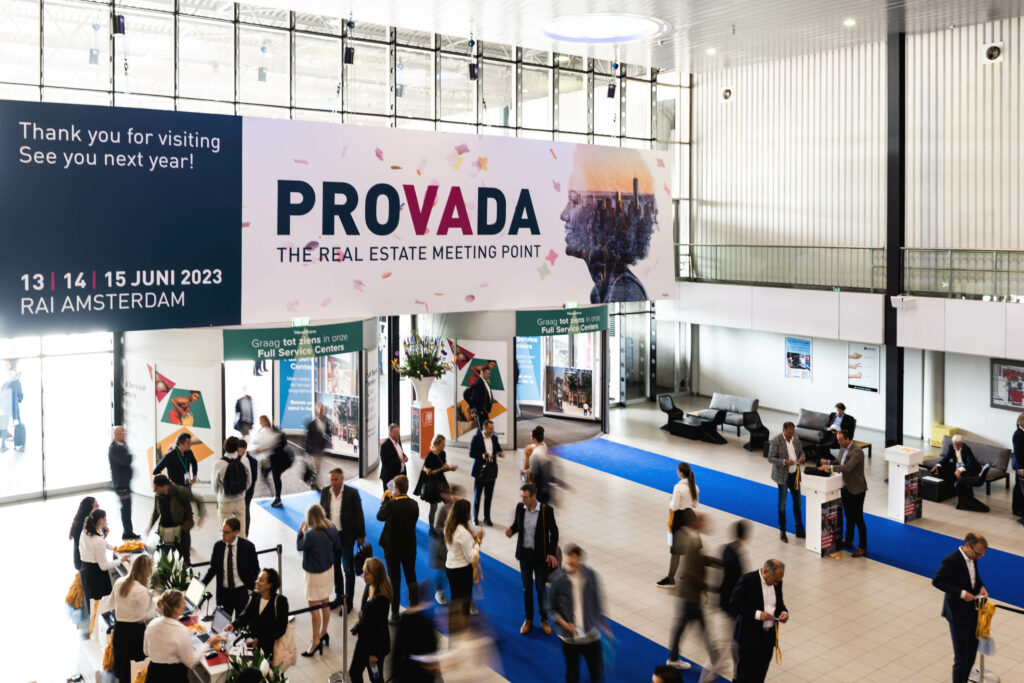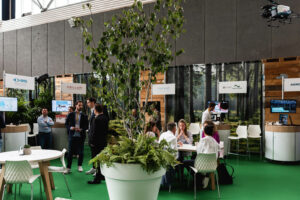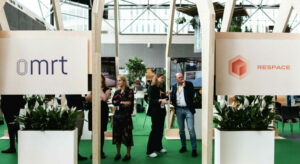Last week I attended PROVADA, an interesting networking and knowledge event for the real estate sector. The theme this year was ‘Act now for a better tomorrow’ and that was reflected in the program. There is of course a lot to see and learn at PROVADA, I would like to share four special trends that I saw at the fair with you.

1. Sustainability, but applicable
Sustainability has been a theme for the real estate sector for years, but I think it has only really been on the agenda in the last few years. Since Covid and the rising energy prices due to gas shortages, it is clear that the ‘better tomorrow’ that PROVADA has put on the agenda should actually already be realised sooner rather than later. Because as you may know, real estate is responsible for 40% of all emissions and this sector must move in order to achieve the goals of the Paris climate agreement.
Many booths at the fair had a special section dedicated to their sustainability story and how they reduce their environmental impact and carbon footprint. And not just the philosophy, but also the practical implementation. How can you make buildings more sustainable? What installations are there for residential construction with water extraction? Even everyday kitchens have to rely on it. Ambition is no longer enough, you also have to be able to put it into practice. More and more companies are finally giving shape to it.
At hello energy, we use our software to improve the visibility of sustainability within (office) buildings and involve everyone in the process. We show how visitors and tenants in buildings themselves can make a direct impact and save energy together. We do this with attractive visualisations, inspiring content and helpful insights that encourage them to change their behaviour.

2. ‘Embodied carbon’ or ‘Retrofitting’ is getting more and more attention
Where the completion of a new building was seen as a showpiece, circular solutions now predominate. ‘Retrofitting’, or adapting existing buildings to the latest sustainable standards, now increasingly appears to be the first choice for real estate development.
The program passed sustainable certifications such as BREEAM, WELL and GRESB, and BREEAM-in-use (for buildings that are already in use) seems to be gaining ground.
Interesting are, for example, the projects of Respace where, with a kind of prefab wood construction solution, even historic buildings can be renovated in a more sustainable, cheaper and often less invasive way. Or the project of Urban Climate Architects, where a 10-storey building is being designed from an entirely wooden structure.
‘Embodied carbon’ or the amount of carbon released in the production process of a building, for example, can be significantly reduced by using only local cement or only using wood construction.
The combination of biobased, circular, retrofitting, local materials and prefab are just a few examples of many interesting developments that I saw at the event.
3. Alternative building is the new adage
Traditional real estate is based on an existing purpose, or ‘purpose-built real estate’. If the Covid crisis has taught us anything, it is that the use of buildings and offices can change at a rapid pace.
More and more real estate portfolios are therefore becoming more flexible, in order to make their investment more future-proof and ready for alternative use, should this be necessary at a later date.
Just do a quick google search for ‘non traditional asset classes’ and you will see that this could be the future of real estate. For example, read this article by Savills in which flexible leasing is on the rise.
4. Proptech and digital twins
Innovative software and proptech (property technology) could of course not be missed this year. I found a good example of innovation in Aeroscan, which helps to capture real estate completely digitally with drones and 3D software.
This naturally contributes to the creation of a so-called ‘digital twin’, a digital copy of your building with which you can collect more and more information about your real estate (portfolio) and make better data-driven decisions in real-time. Because, we all know, twinning is winning!
Above all, I found PROVADA to be an inspiring place where innovation, technology, sustainability and real estate come together in a fun way. I had interesting conversations, saw great new concepts and ideas and was able to get a good idea of what the real estate industry is doing.
If you were not there, it is definitely recommended to experience the next edition. I hope to see you there next year!
